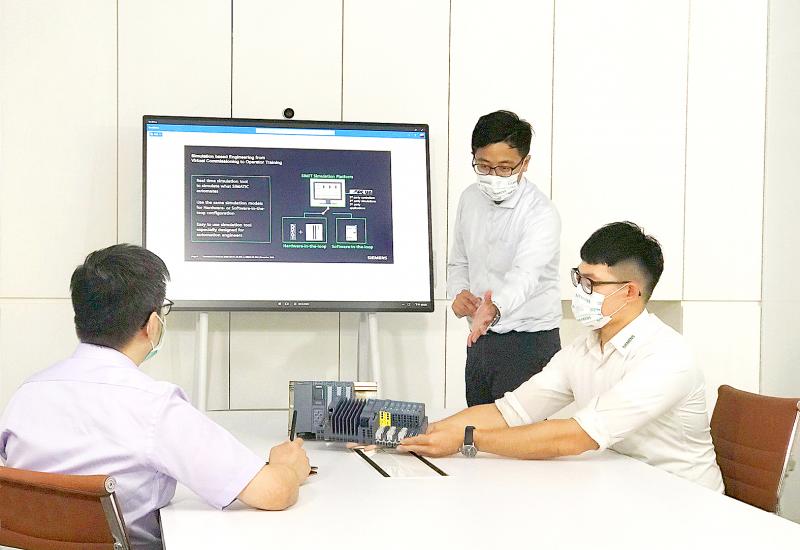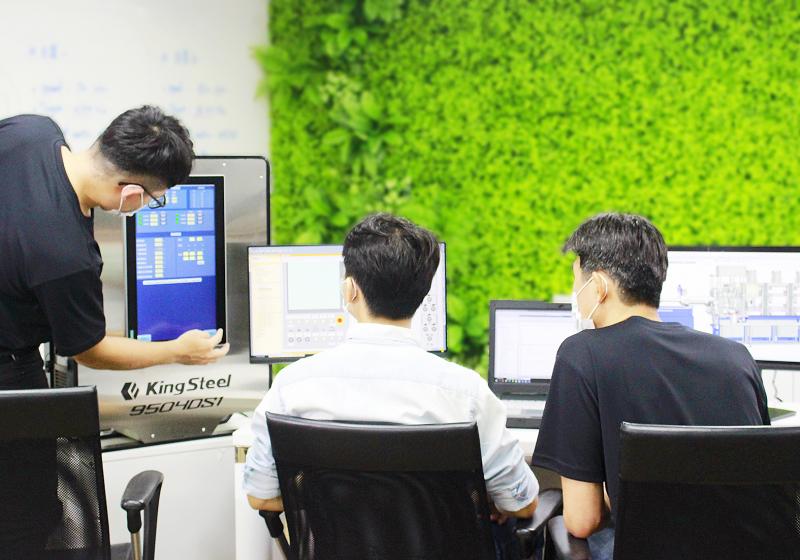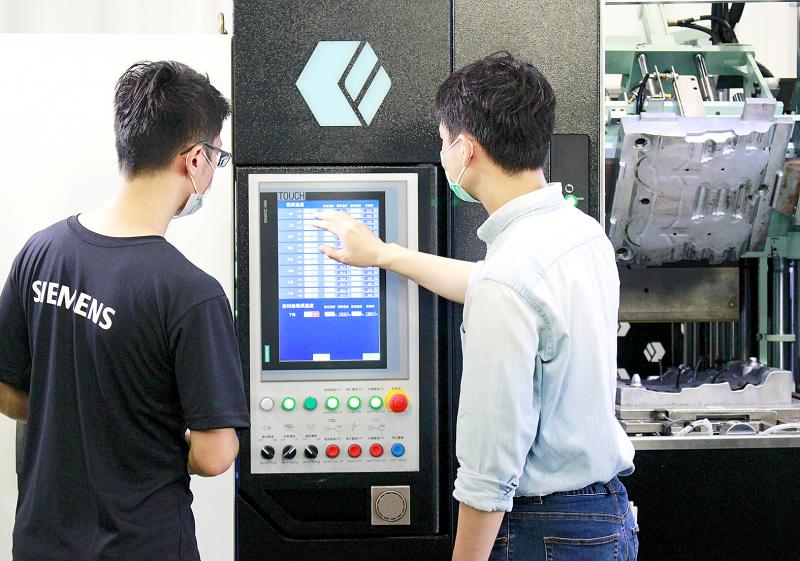The global fourth industrial revolution in smart manufacturing and automation requires intelligent solutions. On Wednesday (Aug. 18), German engineering giant Siemens started a month-long Digital Enterprise Virtual Expo. The expo specially showcases a collaboration project between Siemens and King Steel, Taiwan’s leading producer of shoe-making machinery. The expo demonstration how the project used full-spectrum digital solutions to assist companies in implementing a successful digital transformation of their manufacturing processes.
King Steel manufacturing machinery use Siemens SIMATIC controllers integrated with Siemens Digital Twin digitization solutions to accelerate the development of new machines and more efficient management of component wastage. Siemens and King Steel, two powerhouses within their respective industries, are joining hands and making great strides toward decoding the fourth industrial revolution.
Siemens continues to promote digital industries in Taiwan, this year signing a memorandum of agreement to collaborate with King Steel in the development of key fourth industrial revolution applications for the manufacturing industry.

Photo courtesy of Siemens/King Steel
Siemens Taiwan’s general manager of digital industry, Tino Hildebrand, said: “Taiwan is a world-class center for shoe manufacturing and Siemens is fortunate to have the opportunity to work closely with top manufacturer King Steel to introduce Siemens’ full-spectrum digitalization solutions. Siemens is assisting King Steel to upgrade its shoe machinery design and manufacturing to help drive forward industrial productivity, improve flexibility, realize digital transformation within a fast-changing global market.”?
According to Jim Chen (陳璟浩), special assistant to King Steel chairman, “As we enter a post-COVID-19 era, many of our customers are facing staff shortage problems, particularly involving the production process of rubber soles, which is quite complex.
In the past, one piece of equipment would require between four and six people to operate it, consuming both time and labor cost.

Photo courtesy of Siemens/King Steel
By teaming up with Siemens and employing its highly-efficient SIMATIC S7 series of controllers and integrating this with Siemens digital software, we have been able to significantly increase the production efficiency of our equipment, reducing labor intensity by as much as 80 to 90 percent.
Additionally, during the early stages of the equipment’s development, Siemens’ Digital Twin solution — abbreviated to NX MCD — allows for pre-production virtual reality simulated testing. This greatly shortens the product development timeline and allows King Steel to produce bespoke digital transformation platforms for its customers.
The successful collaboration between King Steel is an important milestone, providing a basis for future cooperation between the two companies, facilitating rapid research and development and producing a competitive edge for King Steel.

Photo courtesy of Siemens/King Steel
For more than 40 years, King Steel has placed an important emphasis on research and development as well as innovation. Responding to industry requirements for digital transformation and smart manufacturing, King Steel has partnered with Siemens to develop a new generation of smart machinery with leading industries in mechatronics, open communication and integrated virtual reality.
Siemens provides a comprehensive integrated automation platform, called the TIA Portal, which pairs the high-performance SIMATIC S7-1500 controller with Digital Twin integrated virtual reality solutions, which also incorporates motor components on the same platform. The fully-integrated mechatronic platform achieves the aim of improving the efficiency of high-end manufacturing machinery research and development.
Siemens emphasizes that its SIMATIC S7-1500 high-performance controller has excellent system functions, an extremely short response time, and the best and safest technical integration.
Paired with the Digital Twin solution and NX MCD mechatronics conceptual design, which incorporates CAD 3D modeling, digital modeling of equipment and machinery can be generated. This allows for simulation testing and adjustments to be carried out during the early stage of the development and procurement, greatly reducing the development time of new machinery and equipment, and saving on development costs.
King Steel is leading position as a world-class producer of shoe-making machinery and equipment has working with Siemens to develop and integrate the latest technologies. Through seamless connection of digital software and hardware, and the use of big data, King Steel has been able to streamline the development process and shorten time-to-market.
As the industry marches on towards the goal of factory automation, King Steel is well-placed to meet the goals of automated smart production and remote, real-time management that its customers demand; helping its clients build smart factories for the future and enhance their international competitiveness.
For more information on the Digital Enterprise Virtual Expo, which runs through to Sep. 17, please visit: https://www.siemensdi.com.tw

POWERING UP: PSUs for AI servers made up about 50% of Delta’s total server PSU revenue during the first three quarters of last year, the company said Power supply and electronic components maker Delta Electronics Inc (台達電) reported record-high revenue of NT$161.61 billion (US$5.11 billion) for last quarter and said it remains positive about this quarter. Last quarter’s figure was up 7.6 percent from the previous quarter and 41.51 percent higher than a year earlier, and largely in line with Yuanta Securities Investment Consulting Co’s (元大投顧) forecast of NT$160 billion. Delta’s annual revenue last year rose 31.76 percent year-on-year to NT$554.89 billion, also a record high for the company. Its strong performance reflected continued demand for high-performance power solutions and advanced liquid-cooling products used in artificial intelligence (AI) data centers,

SIZE MATTERS: TSMC started phasing out 8-inch wafer production last year, while Samsung is more aggressively retiring 8-inch capacity, TrendForce said Chipmakers are expected to raise prices of 8-inch wafers by up to 20 percent this year on concern over supply constraints as major contract chipmakers Taiwan Semiconductor Manufacturing Co (TSMC, 台積電) and Samsung Electronics Co gradually retire less advanced wafer capacity, TrendForce Corp (集邦科技) said yesterday. It is the first significant across-the-board price hike since a global semiconductor correction in 2023, the Taipei-based market researcher said in a report. Global 8-inch wafer capacity slid 0.3 percent year-on-year last year, although 8-inch wafer prices still hovered at relatively stable levels throughout the year, TrendForce said. The downward trend is expected to continue this year,

A proposed billionaires’ tax in California has ignited a political uproar in Silicon Valley, with tech titans threatening to leave the state while California Governor Gavin Newsom of the Democratic Party maneuvers to defeat a levy that he fears would lead to an exodus of wealth. A technology mecca, California has more billionaires than any other US state — a few hundred, by some estimates. About half its personal income tax revenue, a financial backbone in the nearly US$350 billion budget, comes from the top 1 percent of earners. A large healthcare union is attempting to place a proposal before

Vincent Wei led fellow Singaporean farmers around an empty Malaysian plot, laying out plans for a greenhouse and rows of leafy vegetables. What he pitched was not just space for crops, but a lifeline for growers struggling to make ends meet in a city-state with high prices and little vacant land. The future agriculture hub is part of a joint special economic zone launched last year by the two neighbors, expected to cost US$123 million and produce 10,000 tonnes of fresh produce annually. It is attracting Singaporean farmers with promises of cheaper land, labor and energy just over the border.